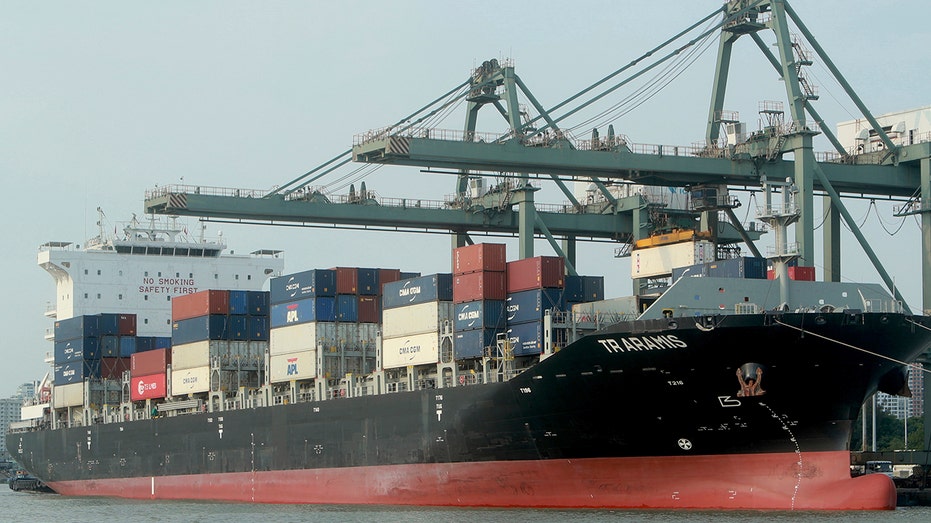World Bank cuts China growth forecast as COVID-19, real-estate crunch take toll
Emerging economies in Asia are seen outpacing China for the first time since 1990
'Awful' China economic data subdues US stocks
'Varney & Co.' analyzes the declining stock market after weaker than expected growth data out of China.
The World Bank said it expects developing economies in East Asia to grow faster than China this year for the first time since 1990, as the world’s second-largest economy struggles with a real-estate crunch and the government’s zero-tolerance approach to COVID-19.
The Washington, D.C.-based lender cut its forecast for Chinese growth this year but said it expects growth among 22 neighboring economies to more than double in 2022 compared with the pace they notched last year, as countries benefit from dismantling most COVID-19 restrictions and a revival in tourism.
The bank said the outlook for the region is threatened, however, by the risk that central banks, including the U.S. Federal Reserve, raise interest rates more aggressively than investors anticipate to contain galloping inflation. That could hurt global growth and fuel financial stress in heavily indebted emerging markets, it said.

China immigration inspection officers in protective overalls march near a container ship at a port in Qingdao in eastern China's Shandong province Sunday, Nov. 7, 2021. (Chinatopix via AP / AP Images)
APPLE MOVES MANUFACTURING OF IPHONE 14 FROM CHINA TO INDIA
The World Bank said in its latest assessment of the developing economies of East Asia and the Pacific that it expects China to expand 2.8% in 2022. That is down from a 4.3% forecast in June, and makes the World Bank gloomier on China’s prospects this year than the International Monetary Fund, which forecasts 3.3% growth, and some private-sector forecasts from banks, including Goldman Sachs Group and Standard Chartered.
"China’s success in containing COVID-19 infections comes at a significant economic cost," the lender said in a report published Monday. It also highlighted the drag from a severe real-estate downturn, with sales, prices and construction activity all falling as developers wrestle with heavy debts and consumers lose confidence in a market plagued by unfinished projects.
KANSAS COMPANY STIFFED BY VIETNAM, DEMANDS ACTION
The Asian Development Bank last week cut its forecast for Chinese growth this year, to 3.3% from 5% in April. Financial institutions including Goldman Sachs, Nomura and S&P Global Ratings in recent days have cut their forecasts for growth next year, too, citing a darkening global backdrop and the chance that China sticks with its zero-COVID policy well into next year.
| Ticker | Security | Last | Change | Change % |
|---|---|---|---|---|
| GS | THE GOLDMAN SACHS GROUP INC. | 943.62 | +14.87 | +1.60% |
| NMR | NOMURA HOLDINGS INC. | 9.30 | +0.17 | +1.92% |
| SPGI | S&P GLOBAL INC. | 444.28 | +5.12 | +1.17% |
The region encompassed by the report includes China and Southeast Asian economies such as Malaysia and Indonesia, as well as Pacific islands such as Samoa and Tonga. In all, it covers 23 countries, though not advanced Asian economies such as South Korea, Singapore and Japan.
The region excluding China is expected to grow 5.3%, up sharply from the 2.6% recorded in 2021. Vietnam is forecast to expand 7.2%; the Philippines, 6.5%; Malaysia, 6.4%; and Indonesia, 5.1%.

In this May 3, 2020, file photo, containers are loaded on a ship at the Saigon port in Ho Chi Minh city, Vietnam. China and 14 other countries have agreed to set up the world’s largest trading bloc, encompassing nearly a third of all economic activit
JAPAN INTERVENES IN FX MARKET TO STEM YEN FALLS AFTER BOJ KEEPS SUPER-LOW RATES
"Within the region we see a reversal of roles," Aaditya Mattoo, World Bank chief economist for East Asia and the Pacific, said in an interview, referring to China lagging behind other economies in a region where it usually drives growth.
Some of those economies are still smaller than they were before the pandemic, underscoring the prospect for continued domestic growth to close the gap even as Western demand for Asian exports fades. Output in Cambodia, the Philippines and Thailand is expected to surpass prepandemic levels this year, the World Bank said.

The sun sets behind the golden mount temple in Bangkok Saturday, March 12, 2022. (AP Photo/Sakchai Lalit / AP Newsroom)
CLICK HERE TO GET THE FOX BUSINESS APP
Most countries have relatively low debts and manageable financing needs, it said. However, some could come under pressure as a strengthening dollar and rising interest rates push up debt-servicing costs, an especially painful mix for those with foreign currency borrowings, such as Laos and Mongolia, the World Bank said.




















